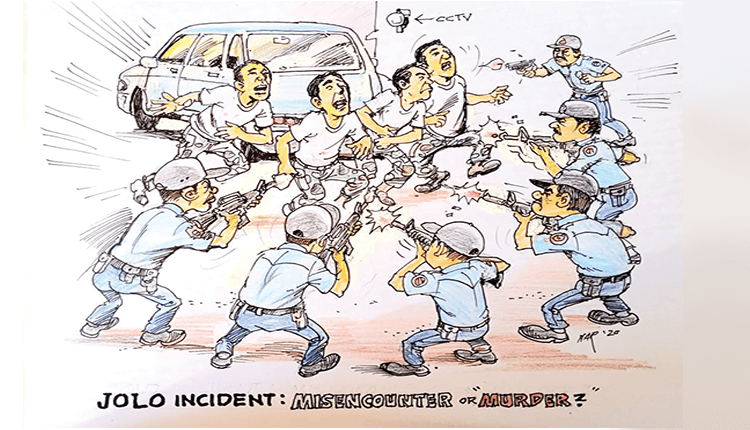IT WOULD be a week now as this edition goes to press but the impact of the cold-blooded murder of four members of the Intelligence Service Group (ISG) of the Philippine Army by members of the Jolo, Sulu Police Office last June 29, 2020, continues to reverberate.
And why not, when the knee-jerk reaction of the Philippine National Police (PNP) on the incident is to cover up the murderous deed of the policemen involved complete with a scenario fitting a “movie script,” (“parang sa pelikula”), as Lt. General Gilberto Gapay, commanding general of the Philippine Army, aptly described it.
Had it not been for the series of CCTV footages and photos that immediately circulated showing the policemen shooting the clearly surprised soldiers without any provocation, the PNP could have gotten away with its first official version, which is:
That the victims were “unidentified gunmen” who tried to flee from a police checkpoint and when those manning the checkpoint caught up with them, the victims “pointed their guns” at the police-suspects thus forcing the latter to retaliate in “self-defense.”
Translation? What happened was a “misencounter,” as PNP spokesman, B/Gen. Bernard Banac termed it, impliedly telling us that the soldiers were indeed fully-armed when they were confronted by the policemen.
In other words, it’s the the usual, “nanlaban” narrative, the ‘stock-in-trade,’ “all-size, fit all” alibi of the PNP that has rightly agitated a lot of our military men, both retired and in active service.
Two days later, on Wednesday, Banac issued a “revised version,” this time conceding—but without apologizing—that what transpired is a “shooting incident,” which, to us, still falls far short of what really happened— only the policemen were doing the shooting during the entire incident as the soldiers were unarmed and yes, “clueless” of the fate that awaited them.
In other words, it’s the same “nanlaban” version but named differently by the PNP.
We believe that it is this, this reluctance by the PNP to readily admit mistake and apologise for it that has gotten the goat of the public, the military establishment in particular.
Indeed, it was only after CGPA Gapay and former AFP chief, Ricardo Visaya, supported by public sentiment, rejected the PNP’s first version of the incident that the PNP acted to “revise” its statement.
Gen. Visaya’s social media post sums up one major, persistent problem of our national police organization, when he said: “PNP at Camp Crame should stop covering (up) for their abusive men.”
Until such time that the PNP has evolved into a truly professional organization that puts to heart its motto of “To Serve and to Protect,” we can only be horrified by the thought that the Jolo incident would be repeated again and again. And with the victims not only their fellows in law enforcement the next time around.



